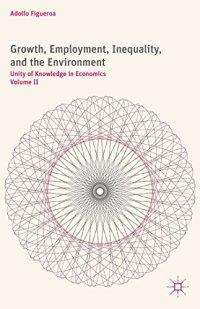
Ebook: Growth, Employment, Inequality, and the Environment, Volume II: Unity of Knowledge in Economics
Author: Adolfo Figueroa
- Genre: Economy
- Tags: Development Growth Economics Business Money Economic Conditions Environmental Theory Finance New Used Rental Textbooks Specialty Boutique
- Year: 2015
- Publisher: Palgrave Macmillan
- Language: English
- pdf
The second volume of Growth, Employment, Inequality, and the Environment continues dealing with the fundamental economic problems of our time: employment, inequality, the environment, and quality of life. This volume takes on the long-term effects of growth and analyzes the policy aspect of these effects.
Figueroa achieves his goal by addressing two significant problems. First, to solve the epistemological challenges of building unity of knowledge, he presents a unified theory of capitalism. Second, he considers the epistemological problem of the role of theory in scientific knowledge. This book therefore deals with a consistent theoretical system. That having been said, these theories—which contain logically correct propositions—may turn out to be empirically false. In order to avoid this error, some rules of scientific knowledge are needed. Growth, Employment, Inequality, and the Environment presents a method that contains such rules. The method is derived from the Popperian epistemology, making it operational in economics. The proposed unified theory is therefore empirically valid; it is a good approximation of the real world. Theoretical economics is thus treated under explicit epistemological rules: theory is the servant, not the master.
Figueroa achieves his goal by addressing two significant problems. First, to solve the epistemological challenges of building unity of knowledge, he presents a unified theory of capitalism. Second, he considers the epistemological problem of the role of theory in scientific knowledge. This book therefore deals with a consistent theoretical system. That having been said, these theories—which contain logically correct propositions—may turn out to be empirically false. In order to avoid this error, some rules of scientific knowledge are needed. Growth, Employment, Inequality, and the Environment presents a method that contains such rules. The method is derived from the Popperian epistemology, making it operational in economics. The proposed unified theory is therefore empirically valid; it is a good approximation of the real world. Theoretical economics is thus treated under explicit epistemological rules: theory is the servant, not the master.
Download the book Growth, Employment, Inequality, and the Environment, Volume II: Unity of Knowledge in Economics for free or read online
Continue reading on any device:

Last viewed books
Related books
{related-news}
Comments (0)